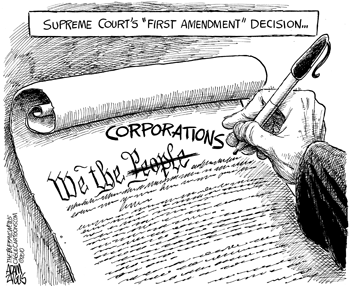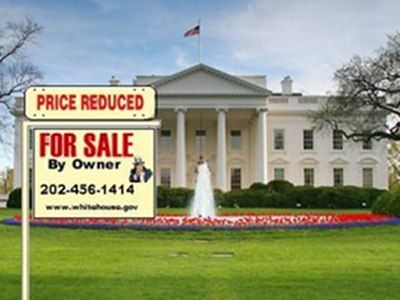What we do for love, or in this case the love of money. This is very evident with President Barack Obama’s Commerce Secretary nomination of Chicago multi-billionaire and Hyatt Hotels heiress Penny Pritzker, who served as his campaign fund-raiser.
Now the fact that Obama is heavily in the Pritzkers’ debt is no secret; Penny was Obama’s campaign finance chairman in 2008 (and make no mistake, Obama has considerably exaggerated the importance of small donors. He was and remains a machine candidate) and was co-chairman of his reelection campaign. But the roots go much, much deeper. If you haven’t read it already, I strongly urge you to read a speech by Robert Fitch to the Harlem Tenants’ Association one week after Obama’s 2008 win, in which he correctly foretold how Obama would behave towards big financial firms based on his long-standing role as a front for them. The important part is his description of the role that Obama played in the redevelopment of the near South Side of Chicago, and how he and other middle class blacks, including Valerie Jarrett and his wife Michelle, advanced at the expense of poor blacks by aligning themselves with what Fitch calls “friendly FIRE”: powerful real estate players like the Pritzkers and the Crown family, major banks, the University of Chicago, as well as non-profit community developers and real estate reverends.
She was previously nominated in 2008 for the same position but faced with awkward questions about her financial dealings, she declared that she did not want the nomination. Those same questions remain:
Penny Pritzker’s Commerce (Part One)
by Rick Perlstein, The Nation
n December of 2008, Obama’s choice for Secretary of Commerce, Chicago-based business tycoon Penny Pritzker, withdrew her name from consideration in the face of a triple-barreled onslaught. First, there was her position on the board of Superior Bank, which her family bought with the help of $645 million in tax credits for the federal government. In 2001, Superior collapsed after pioneering the bottom-feeding trade in subprime mortgages. In In These Times, David Moberg called it a “mini-Enron scandal”; 1,406 uninsured depositors lost their savings. [..]
Here was the second concern which kept her from the Commerce Department in 2008: “Whether she could disentangle herself,” as The Washington Post put it, from her family’s “vast financial holdings”-many of which they would prefer not to see scrutinized in public. How vast? Well, way back in 1973, The New York Times reported of “The Very Private Pritzkers,” “The family law firm, Pritzker & Prizker, hasn’t accepted an outside client for thirty years because of the potential conflict of interest with the Pritzker enterprises, which are too numerous for any one member of the family to recall at any given moment.” In 1982, when the list became public for the very first time-more on why later-the holdings included at least 216 separate corporate entities, from mining to motels. [..]
The third reason Obama chose not to risk political capital on a Penny Pritzker nomination fight is that unions despise her. Among the reasons: the Hyatt hotel chain, which the Pritzkers built practically from nothing, is infamous for just about the worst treatment of their staff in the business. (Here’s a moving first-hand account.)
Penny Pritzker’s Commerce (Part Two)
by Rick Perlstein, The Nation
Did you know that in the early 1970s, the Internal Revenue Service investigated the Pritzker family, whose scion Penny Pritzker has just been tapped by President Obama to become Secretary of Commerce, because their Hyatt Corporation was paying no taxes? [..]
Did you know that this particular financial institution, Castle Bank & Trust of the Bahamas, was founded by a veteran of the wartime spy agency the Office of Strategic Services who specialized in creating front organizations for the CIA, and helped launder funds for attempts to overthrow Fidel Castro? [..]
Did you know that the IRS dropped a major investigation of Castle in 1977, according to The Wall Street Journal, at the behest of the Central Intelligence Agency? [..]
Perlstein notes the New York Times reporter Charles Savage asked the White House what made Pritzker’s nomination “more suitable” now that it was in 2008:
When asked what had changed since 2008, Eric Schultz, a White House spokesman, said that Ms. Pritzker was in a different place.
“At the time,” he said, “she was managing an extensive portfolio of businesses that were under pressure due to the financial crisis. Those businesses had thousands of employees. She also had an ongoing obligation to oversee her family’s restructuring of assets to separate out the interests of various family members.”
Indeed, a Democrat familiar with the Obama transition team said in 2008 that Ms. Pritzker’s family had resisted any nomination because their assets were so entangled. Last week, a White House official involved in vetting her said they had since completed dividing up their finances.
What Perstein said:
Got that? It took lawyers four years to figure out how to divest her from the sleaze. And that’s what makes her qualified for the job-a job not unrelated to the devising and interpretation of tax policy itself. And, not incidentally, a job concerned with subjects like this:
Tax evasion by individuals with unreported offshore financial accounts was estimated by one IRS commissioner to be several tens of billions of dollars, but no precise figure exists. IRS has operated four offshore programs since 2003 that offered incentives for taxpayers to disclose their offshore accounts and pay delinquent taxes, interest and penalties. GAO was asked to review IRS’s second offshore program, the 2009 OVDP. [..]
That’s the abstract to a paper published two months ago and distributed by the Commerce Department’s National Technical and Information Service. I would give far more than a penny to hear Pritzker’s thoughts about that.
Why does the image of the late Leona Helmsley keep flashing in my mind? Oh, “we don’t pay taxes. Only the little people pay taxes” Yes, Penny will be a wonderful role model for women everywhere. Good choice, Barack.

 It has been four years since the Supreme Court handed down it ruling in
It has been four years since the Supreme Court handed down it ruling in  President Barack Obama’s campaign organization, “Obama for America” (OFA), is being reinvented as as a 501(c)(4) tax-exempt “social welfare group” that is not subject to federal contribution limits, laws that bar White House officials from soliciting contributions, or the stringent reporting requirements for campaigns. The goal is to raise $50 million support of Mr. Obama’s second-term policy priorities, including efforts to curb gun violence and climate change and overhaul immigration procedures. Much like the alleged “grassroots” organizations, The Tea Party and Freedom Works, the new organization, now known as “Organizing for Action” (still OFA, so as not to confuse Obama supports), will derive most of its budget from a select group of donors who will each contribute or raise $500,000 or more. Sounds harmless? But wait, there’s more, as
President Barack Obama’s campaign organization, “Obama for America” (OFA), is being reinvented as as a 501(c)(4) tax-exempt “social welfare group” that is not subject to federal contribution limits, laws that bar White House officials from soliciting contributions, or the stringent reporting requirements for campaigns. The goal is to raise $50 million support of Mr. Obama’s second-term policy priorities, including efforts to curb gun violence and climate change and overhaul immigration procedures. Much like the alleged “grassroots” organizations, The Tea Party and Freedom Works, the new organization, now known as “Organizing for Action” (still OFA, so as not to confuse Obama supports), will derive most of its budget from a select group of donors who will each contribute or raise $500,000 or more. Sounds harmless? But wait, there’s more, as
Recent Comments